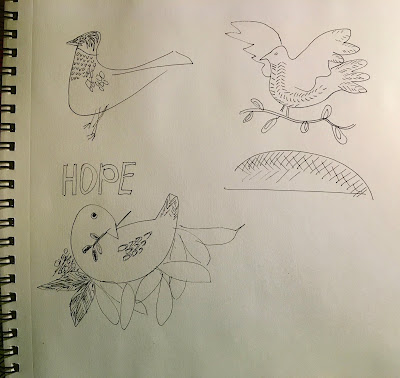This is what Lent is designed to do: nurture hopefulness in the face of dashed dreams. ... Lent is about more than swearing off bad habits. Lent is about cultivating resilience. Lent is the season of learning to commit and sustain love in all circumstances. It’s a season of releasing what does not serve you and practicing the habits of resilience that empower you to rebuild and participate in healthy community after a disaster or a loss.My goals are to:
- Recilience Habits: Recilience has lots of parts - equanimity, flexibility, resolution, tenacity, social intelligence, and optimism to name a few. I want to gradually add in some useful daily habits as a practical way to grow in recilience.
- Fast from binge eating: I try to choose something to fast from that is a good symbol of how I am trying to grow, and I think my binge eating has a direct connection to feeling overwhelmed by life's challenges.
- Educate myself: I'm reading the book The Coward's Guide to Conflict: Empowering Solutions for those Who Would Rather Run Than Fight.
- Inner work: Ground myself in journaling, meditation, and prayer to connect to my core of peace and courage.
- Take creative action: Take decisive action on adverse or challenging situations as they arise, and use my creative super powers to grow, and make the world better.
February 26, Ash Wednesday-
1. Begin fasting: One of the main things I need to stop doing in order to become more resilient is ignoring or hiding from challenging situations rather than acting positively to improve them. I think that binge eating (eating 4 scones, a whole sleeve of crackers, etc.) is a good symbol for how I negatively react to overwhelming challenges.
I've decided to fast this Lent from binge eating: I will eat only small portions, and especially reduce my carb intake.When I feel the urge to binge, I'll try instead to take a small positive step to face a challenge.
 2. Study "The Coward's Guide to Conflict": Read Chapters 1-3 this week.
2. Study "The Coward's Guide to Conflict": Read Chapters 1-3 this week.The author lists 7 choices one can make in a conflict, and I use all of them at times, but the one I use most is avoidance: I'd rather not answer the phone, not come face-to-face with the angry person, and not deal with the problem at all.
The assignment is to track my behavior over the next week and build awareness of how I want to change.
3. Recilience Habits: I've already worked a few daily Equanimity habits into my life, to help me to maintain calmness no matter what life throws at me:
- Start each day by feeling grateful for the gift of this new day.
- End each day by stating out loud a few things I've accomplished, to acknowledge my successes, and bring my mood up.
February 27-
4. Draw a Lino block: I'm working on a series of block-printed prayer flags to hang in public spaces, and today I'm starting one for Resilience.
One of the things I like most about the Craftivism movement is that, as I work, I'm not only expressing my hope for change, but also creating a quiet space for myself to regain a sense of power and purpose.
February 28-
5. Research and write: We had a conflict during business meeting last Sunday, and I want to write a response to those who were present. Soon I will have to act, using this research, to bridge a gap that was created - but first I need to put my thoughts in order.
February 29-
6. Write a letter: Hopefully I now have an idea of how to address the conflict of last Sunday, and can write a letter to those present.4. Draw a Lino block: I'm working on a series of block-printed prayer flags to hang in public spaces, and today I'm starting one for Resilience.
One of the things I like most about the Craftivism movement is that, as I work, I'm not only expressing my hope for change, but also creating a quiet space for myself to regain a sense of power and purpose.
February 28-
5. Research and write: We had a conflict during business meeting last Sunday, and I want to write a response to those who were present. Soon I will have to act, using this research, to bridge a gap that was created - but first I need to put my thoughts in order.
February 29-











